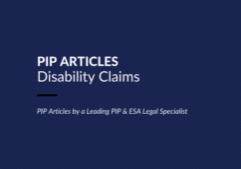Personal Independence Payments (PIP) for over 65
Personal independence payment (PIP) is the disability benefit for those of working age. It is replacing disability living allowance (DLA), in that new claimants can only claim PIP and the Department continues to move people to the ‘new’ benefit. In May 2012, there were over 3.2 million DLA claims and the move began in April 2014. There are exceptions to the rule, but for the most part, the upper age for claiming PIP is the day you reach state pension age. Unless one of the exceptions explained below applies, the only disability benefit that you can claim after reaching 65 is attendance allowance (AA), which has many similarities to the old DLA. A major difference is that there is no mobility component and no lowest rate of the care component, so that AA has only a lower and a higher rate. Lower rate applies where either a day time or a night time condition applies, (we are talking about the need of “attention” – physical help or someone talking to you; or the need for supervision), and higher rate where both a day time and a night time condition applies.
Those exceptions:
- If your date of claim for PIP is before you reached state pension age, then PIP can still be awarded.
- Those people who were already entitled to PIP when they reached state pension age continue to get it. This includes where you were refused an award of PIP and are awarded it at either the reconsideration or tribunal appeal stages, because that decision maker or tribunal will have decided that you were entitled to the benefit before you reached state pension age. If this paragraph applies to you, then it can make sense to explore every option to challenge a wrong decision, to get that award of PIP before the door closes, forever.
- If you had not yet reached your 65th birthday on 8th April 2013, and either you are entitled to DLA now; or your entitlement to DLA ended less than a year ago, you can still make a claim for PIP, even if you are now over state pension age.
- Even if you are over the state pension age, you can still make a renewal claim to PIP up to 6 months before any end date on that PIP award.
- If you have been entitled to PIP, but no longer get it for some reason, and you are now over the state pension age, you are allowed to reclaim PIP within 12 months of your old award ending. There are conditions though for this exception; you can only be awarded the enhanced rate of mobility if you had that rate in an award of either rate that ended less than one year before you make this new claim, and you meet the normal criteria for enhanced rate. Also, your reason for getting enhanced rate must either be the same medical condition that enabled you to qualify before; or a new condition that has developed because of that old one.
A change of circumstances can result in the DWP carrying out a ‘revision’ or a ‘supersession’, basically, reviewing the award. When this happens after you reach state pension age, then that review can only result in an award of either rate of the mobility component if you had a mobility award before the review, or that mobility award ended less than a year before the date of the review. To keep the same rate of the mobility component after such a review, the reason for your mobility problems must be substantially the same reason/medical condition that lead to the award in the first place.
A decision maker or tribunal can move you from enhanced rate mobility to standard rate, even where your mobility needs are now due to a completely new medical condition, but you cannot get an award of the mobility component on review where you did not have an award of that component before the review was carried out, and nor can you be awarded enhanced rate mobility where you had only standard rate before the review. Again, don’t accept that the decision maker or tribunal got it right without having your claim and the decision looked at by a competent adviser. Where entitlement depends on age, there can be no way back, which can cost a claimant dearly over an extended period. At today’s rate, enhanced rate mobility is worth £3,100 or £31,000 over 10 years. An award of the enhanced rate of both components is worth £7,700 a year, or £77,000 over 10 years. Leave no stone unturned; get good quality advice on your entitlement, and do not assume that either the decision maker or a tribunal will have got it right. Use the reconsideration stage to gain the option of a tribunal appeal. If your appeal is refused by that tribunal, and you have reason to believe that they might have got it wrong, then get advice on whether their decision was correct in law.
If you have read to this point, you deserve a cup of tea. I hope that you never have to grapple with these rules.


 Would The Ambulance Crew Make It In Time?
Would The Ambulance Crew Make It In Time?